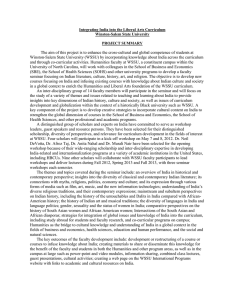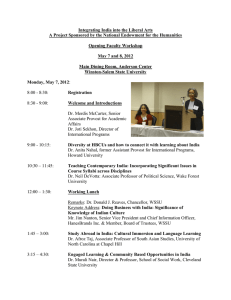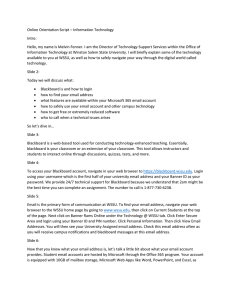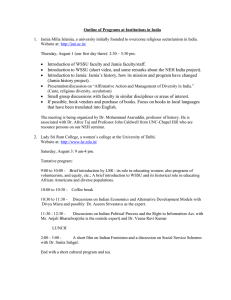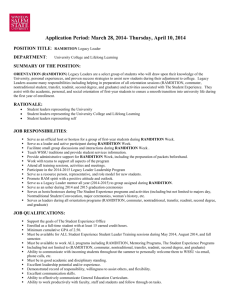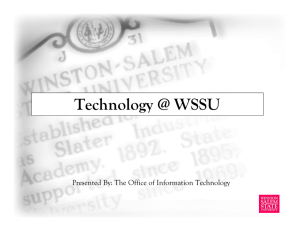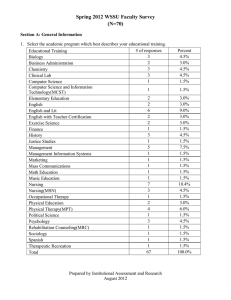Spring 2010 WSSU Faculty Survey (N=102)
advertisement
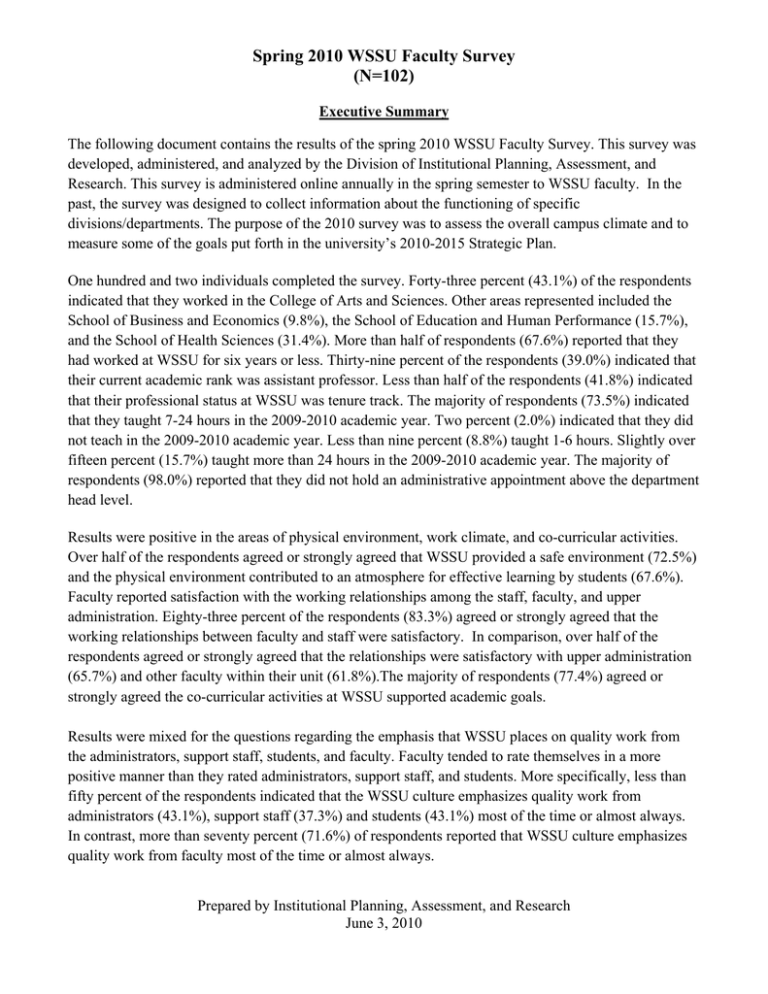
Spring 2010 WSSU Faculty Survey (N=102) Executive Summary The following document contains the results of the spring 2010 WSSU Faculty Survey. This survey was developed, administered, and analyzed by the Division of Institutional Planning, Assessment, and Research. This survey is administered online annually in the spring semester to WSSU faculty. In the past, the survey was designed to collect information about the functioning of specific divisions/departments. The purpose of the 2010 survey was to assess the overall campus climate and to measure some of the goals put forth in the university’s 2010-2015 Strategic Plan. One hundred and two individuals completed the survey. Forty-three percent (43.1%) of the respondents indicated that they worked in the College of Arts and Sciences. Other areas represented included the School of Business and Economics (9.8%), the School of Education and Human Performance (15.7%), and the School of Health Sciences (31.4%). More than half of respondents (67.6%) reported that they had worked at WSSU for six years or less. Thirty-nine percent of the respondents (39.0%) indicated that their current academic rank was assistant professor. Less than half of the respondents (41.8%) indicated that their professional status at WSSU was tenure track. The majority of respondents (73.5%) indicated that they taught 7-24 hours in the 2009-2010 academic year. Two percent (2.0%) indicated that they did not teach in the 2009-2010 academic year. Less than nine percent (8.8%) taught 1-6 hours. Slightly over fifteen percent (15.7%) taught more than 24 hours in the 2009-2010 academic year. The majority of respondents (98.0%) reported that they did not hold an administrative appointment above the department head level. Results were positive in the areas of physical environment, work climate, and co-curricular activities. Over half of the respondents agreed or strongly agreed that WSSU provided a safe environment (72.5%) and the physical environment contributed to an atmosphere for effective learning by students (67.6%). Faculty reported satisfaction with the working relationships among the staff, faculty, and upper administration. Eighty-three percent of the respondents (83.3%) agreed or strongly agreed that the working relationships between faculty and staff were satisfactory. In comparison, over half of the respondents agreed or strongly agreed that the relationships were satisfactory with upper administration (65.7%) and other faculty within their unit (61.8%).The majority of respondents (77.4%) agreed or strongly agreed the co-curricular activities at WSSU supported academic goals. Results were mixed for the questions regarding the emphasis that WSSU places on quality work from the administrators, support staff, students, and faculty. Faculty tended to rate themselves in a more positive manner than they rated administrators, support staff, and students. More specifically, less than fifty percent of the respondents indicated that the WSSU culture emphasizes quality work from administrators (43.1%), support staff (37.3%) and students (43.1%) most of the time or almost always. In contrast, more than seventy percent (71.6%) of respondents reported that WSSU culture emphasizes quality work from faculty most of the time or almost always. Prepared by Institutional Planning, Assessment, and Research June 3, 2010 Spring 2010 WSSU Faculty Survey (N=102) Topics that received less positive ratings were inclusive governance, leadership and engagement, branding and resources. Less than half of respondents felt that WSSU upper administration did a good or excellent job in providing opportunities for faculty, staff, and/or students to be involved in the decisionmaking process (33.3%). Only twenty-nine percent of the respondents (29.0%) thought WSSU was known quite a bit or very much for a distinctive brand of leadership in most learning experiences and activities sponsored by the university. Low levels of satisfaction were noted with staffing, supplies, equipment, computer resources, and physical facilities. More specifically, less than half of the respondents agreed or strongly agreed that the university provides adequate staff (47.0%), faculty position (49.1%), supplies (47.5%), equipment (47.0%), computer resources (50.0%), and physical facilities (42.2%) to support their work unit. Overall, the results of the survey were positive and indicate that the campus climate is supportive of the needs of the WSSU faculty. Nonetheless, the survey did help identify particular areas that may require additional attention. Results suggest that the upper administration should focus more on ensuring decision-making between all levels is more transparent. Greater attention should be made to ensure all parties are represented in the decision-making process. A follow-up should be made to further investigate the underlying reasons for the low ratings and high levels of dissatisfaction on items related to resources, branding, leadership, and inclusive governance. Prepared by Institutional Planning, Assessment, and Research June 3, 2010 Spring 2010 WSSU Faculty Survey (N=102) Section A: General Information 1. Select the academic program which best describes your educational training. # of responses Educational Training 5 Biology 2 Business Administration 7 Chemistry 2 Computer Science 2 Elementary Education(MEd) 4 English 2 Exercise Science 2 Finance 2 Gerontology 2 History 4 Mass Communications 4 Mathematics 2 Computer Science and Information Technology (MCST) 2 Middle Grades Education 2 Management Information Systems (MIS) 3 Music Education 11 Nursing 7 Nursing(MSN) 6 Physical Therapy(MPT) 2 Political Science 2 Social Studies Education 4 Spanish 2 Therapeutic Recreation 17 Other 98 Total Prepared by Institutional Planning, Assessment, and Research June 3, 2010 Percent 5.1% 2.0% 7.1% 2.0% 2.0% 4.1% 2.0% 2.0% 2.0% 2.0% 4.1% 4.1% 2.0% 2.0% 2.0% 3.1% 11.2% 7.1% 6.1% 2.0% 2.0% 4.1% 2.0% 17.3% 100.0% Spring 2010 WSSU Faculty Survey (N=102) 2. Please identify the school/college in which you work. Faculty's Work College/School (N=102) College of Arts and Science 43.1% School of Business and Economics 9.8% School of Education and Human Performance 15.7% School of Health Sciences 31.4% 0% 20% 40% 60% 80% 100% Percent of responses 3. Number of years employed at WSSU. Employed's Years at WSSU (N=102) 6.9% 3.9% 3.9% 0 - 6 (67.6%) 17.6% 7 - 12 (17.6%) 67.6% 13 - 18 (3.9%) 19 - 24 (6.9%) more than 24 (3.9%) Prepared by Institutional Planning, Assessment, and Research June 3, 2010 Spring 2010 WSSU Faculty Survey (N=102) 4. Faculty status at WSSU. Faculty's Status (N=102) Percent of responses 100% 90.2% 80% 60% 40% 20% 9.8% 0% Full-time Part-time Status 5. Please identify your gender. Gender (N=98) Percent of responses 100% 80% 63.3% 60% 35.7% 40% 20% 0% Female Male Gender Prepared by Institutional Planning, Assessment, and Research June 3, 2010 Spring 2010 WSSU Faculty Survey (N=102) 6. Please identify your current academic rank. Faculty's Current Academic Rank (N=100) 14.0% 4.0% Assistant Professor (39.0%) 39.0% Associate Professor (20.0%) 23.0% Instructor (23.0%) Lecturer (4.0%) 20.0% Professor (14.0%) 7. Professional status at WSSU. Professional Status at WSSU (N=98) Percent of responses 100% 80% 60% 41.8% 40% 27.6% 30.6% Fixed Term Tenured 20% 0% Tenure Track Professional Status Prepared by Institutional Planning, Assessment, and Research June 3, 2010 Spring 2010 WSSU Faculty Survey (N=102) 8. Hours taught in 2009- 2010 Academic Year. Hours Taught in 2009-2010 Academic Year (N=102) Percent of responses 100% 80% 60% 39.2% 40% 20% 2.0% 34.3% 15.7% 8.8% 0% 0 1-6 7 - 15 16 - 24 more than 24 Hours 9. Do you currently hold an administrative appointment above the department head level? Percent of responses Do you currently hold an administrative appointment above the department head level? (N=101) 100% 98.0% 80% 60% 40% 20% 2.0% 0% No Yes Responses Prepared by Institutional Planning, Assessment, and Research June 3, 2010 Spring 2010 WSSU Faculty Survey (N=102) Section B. Work Climate Please indicate the extent to which you agree with the following statements. # of Don't Strongly Questions Disagree Agree responses know disagree 1. The number of faculty in my department is adequate to get the 102 2.9% 18.6% 36.3% 40.2% job done. Questions In general, working relationships are satisfactory between: # of Don't Strongly Disagree Agree responses know disagree 2. Faculty and Staff. 3. Faculty in my department and the school/college administration. 4. Faculty at Winston-Salem State University as a whole and the upper administration in the university. 5. Overall, I am satisfied with the organizational structure of my school/college. 2.0% Strongly agree 102 1.0% 3.9% 11.8% 57.8% 25.5% 102 6.9% 13.7% 17.6% 47.1% 14.7% 102 8.8% 7.8% 17.6% 61.8% 3.9% 102 3.9% 11.8% 20.6% 55.9% 7.8% Prepared by Institutional Planning, Assessment, and Research June 3, 2010 Strongly agree Spring 2010 WSSU Faculty Survey (N=102) Section C. Resources Questions In order to support my work unit, the university provides adequate... # of Don't Strongly Disagree Agree responses know disagree Strongly agree 1. Staff. 102 2.9% 19.6% 30.4% 43.1% 3.9% 2. Faculty positions. 102 2.0% 11.8% 37.3% 47.1% 2.0% 3. Supplies. 101 0.0% 16.8% 35.6% 46.5% 1.0% 4. Equipment. 102 1.0% 17.6% 34.3% 43.1% 3.9% 5. Computer resources. 102 0.0% 16.7% 33.3% 47.1% 2.9% 6. Physical facilities. 102 3.9% 21.6% 32.4% 41.2% 1.0% 7. Salaries to attract capable faculty to my department. 102 9.8% 9.8% 20.6% 57.8% 2.0% 101 7.9% 10.9% 27.7% 51.5% 2.0% 101 17.8% 8.9% 23.8% 48.5% 1.0% # of responses Don't know Strongly disagree Disagree Agree Strongly agree 102 21.6% 11.8% 13.7% 47.1% 5.9% 102 25.5% 9.8% 18.6% 41.2% 4.9% 102 16.7% 6.9% 22.5% 48.0% 5.9% 102 41.2% 4.9% 13.7% 36.3% 3.9% 8. Salaries to retain capable faculty in my department. 9. Overall, the university applies funding resources consistent with the institutional priorities. Section D. Business Process Questions 1. Hiring practices at the university are fair. 2. Promotion and tenure procedures are fair and equitable in my department. 3. My department uses the results of evaluations for guidance in improving faculty performance. 4. Grievance procedures are adequate and contain appropriate safeguards for the protection of personal and civil rights. Prepared by Institutional Planning, Assessment, and Research June 3, 2010 Spring 2010 WSSU Faculty Survey (N=102) Section E. Physical Environment Questions 1. I believe that the physical environment at WSSU contributes to an atmosphere for effective learning by students. 2. WSSU provides a safe environment (sound building structures, adequate sidewalks, adequate lighting) for all members of the campus community. 3. WSSU provides a secure environment for all members of the community. 4. The university provides sufficient space conducive to informal cultural and intellectual exchanges. 5. The campus has a variety of spaces to encourage student learning. # of responses Don't know Strongly disagree Disagree Agree Strongly agree 102 2.0% 5.9% 24.5% 62.7% 4.9% 102 2.9% 4.9% 19.6% 67.6% 4.9% 102 7.8% 2.0% 18.6% 68.6% 2.9% 102 11.8% 8.8% 31.4% 44.1% 3.9% 102 5.9% 8.8% 24.5% 56.9% 3.9% Prepared by Institutional Planning, Assessment, and Research June 3, 2010 Spring 2010 WSSU Faculty Survey (N=102) Section F. Development and Support Questions 1. My attempts to become a more effective professional are supported by my department. Questions # of responses Don't know Strongly disagree Disagree Agree Strongly agree 102 2.9% 8.8% 14.7% 52.9% 20.6% To what extent do you feel that the WSSU culture emphasizes quality work from the following groups: Most of # of Don’t Almost Some of the responses know never the time time 2. Administrators 102 5.9% 9.8% 41.2% 23.5% 19.6% 3. Faculty 102 0.0% 2.9% 25.5% 52.0% 19.6% 4. Support staff 102 3.9% 8.8% 50.0% 31.4% 5.9% 5. Students 102 0.0% 7.8% 49.0% 34.3% 8.8% To what extent do you feel that the WSSU values professional development and contributions outside of the classroom in the form of? Most of # of Don't Almost Some of Questions the responses know never the time time 6. Providing faculty development 102 2.0% 2.0% 22.5% 51.0% workshops and seminars. 7. Attendance at professional 102 4.9% 8.8% 40.2% 35.3% meetings/conferences. 8. Research support (e.g., administrative support, release 101 9.9% 32.7% 30.7% 21.8% time, teaching load conducive to research, etc). Questions 9. Overall, I am satisfied with the value WSSU places on my development and contributions. Almost always 22.5% 10.8% 5.0% # of responses Don't know Strongly disagree Disagree Agree Strongly agree 102 8.8% 6.9% 24.5% 55.9% 3.9% Prepared by Institutional Planning, Assessment, and Research June 3, 2010 Almost always Spring 2010 WSSU Faculty Survey (N=102) Section G. Branding Questions 1. To what extent do you think WSSU has a distinctive brand of leadership and service that are evident in most learning experiences and activities sponsored by the university? # of responses Don’t know Very little Some Quite a bit Very much 100 9.0% 14.0% 48.0% 18.0% 11.0% Section H. Inclusive Governance, Leadership and Engagement In your opinion, how well does WSSU upper administration do each of the following: # of Don't Questions Poor Fair Good Excellent responses know 1. Listen to concerns of faculty in 102 9.8% 20.6% 30.4% 31.4% 7.8% your department. 2. Give a straight answer when 102 8.8% 16.7% 36.3% 28.4% 9.8% asked a reasonable question. 3. Establish clear priorities for 102 6.9% 10.8% 26.5% 35.3% 20.6% the university. 4. Make decisions transparent to 102 6.9% 23.5% 30.4% 29.4% 9.8% the university community. 5. Provide opportunities for faculty, staff and/or students to 102 6.9% 18.6% 41.2% 23.5% 9.8% be involved in the decision making process. 6. Overall, how well does WSSU upper administration do in the areas of transparency of decision making, communications 102 8.8% 21.6% 34.3% 27.5% 7.8% between all levels of decision making, and providing opportunities for all to be represented in decision making? Prepared by Institutional Planning, Assessment, and Research June 3, 2010 Spring 2010 WSSU Faculty Survey (N=102) Section I. Co-Curricular Activities To what extent do you agree with the following statement? Questions 1. Co-curricular activities at WSSU (organizations, special speakers, cultural performances, campus publications, student government, fraternity or sorority, intercollegiate or intramural sports) support academic goals. # of responses Don't know Strongly disagree Disagree Agree Strongly agree 102 11.8% 2.0% 8.8% 57.8% 19.6% Section J. Community Service How many WSSU-related community outreach projects have you participated in the last year? Questions # of responses 0 1-2 3 or more 1. Academic (e.g. Adult Learning Symposium) 2. Cultural (e.g, Diggs Gallery Exhibitions) 100 32.4% 45.1% 22.5% 99 44.0% 48.0% 8.0% 3. Athletic (e.g., Track Meets) 99 57.6% 32.3% 10.1% 4. Govemance (e.g., Staff Senate) 101 39.6% 31.7% 28.7% Prepared by Institutional Planning, Assessment, and Research June 3, 2010 Spring 2010 WSSU Faculty Survey (N=102) Section K. Customer Service 1. In your opinion, which one area or office has provided you with superior customer service? Areas # of responses O'Kelly Library 10 Academic affairs – Provost office 10 CETL 7 Human resources 6 Note: Data is only reported for the units that received 5 or more responses. 2. In your opinion, which one area or office needs to improve their customer service? Areas # of responses Financial Aid 15 Registrar's Office 13 Human Resources 10 Note: Data is only reported for the units that received 5 or more responses. Prepared by Institutional Planning, Assessment, and Research June 3, 2010
